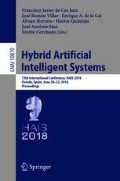Abstract
Large corpus of scientific research papers have been available for a long time. However, most of those corpus store only the title and the abstract of the paper. For some domains this information may not be enough to achieve high performance in text mining tasks. This problem has been recently reduced by the growing availability of full text scientific research papers. A full text version provides more detailed information but, on the other hand, a large amount of data needs to be processed. A priori, it is difficult to know if the extra work of the full text analysis has a significant impact in the performance of text mining tasks, or if the effect depends on the scientific domain or the specific corpus under analysis.
The goal of this paper is to show a framework for full text analysis, called LearnSec, which incorporates domain specific knowledge and information about the content of the document sections to improve the classification process with propositional and relational learning.
To demonstrate the usefulness of the tool, we process a scientific corpus based on OSHUMED, generating an attribute/value dataset in Weka format and a First Order Logic dataset in Inductive Logic Programming (ILP) format. Results show a successful assessment of the framework.
Access this chapter
Tax calculation will be finalised at checkout
Purchases are for personal use only
References
Hersh, W., Buckley, C., Leone, T.J., Hickam, D.: OHSUMED: an interactive retrieval evaluation and new large test collection for research. In: Croft, B.W., van Rijsbergen, C.J. (eds.) SIGIR 1994. Springer, London (1994). https://doi.org/10.1007/978-1-4471-2099-5_20
Moschitti, A., Basili, R.: Complex linguistic features for text classification: a comprehensive study. In: McDonald, S., Tait, J. (eds.) ECIR 2004. LNCS, vol. 2997, pp. 181–196. Springer, Heidelberg (2004). https://doi.org/10.1007/978-3-540-24752-4_14
Muggleton, S., De Raedt, L.: Inductive Logic Programming: theory and methods. J. Logic Program. 19/20, 629–679 (1994)
Eineborg, M., Lindberg, N.: ILP in Part-of-Speech Tagging — an overview. In: Cussens, J., Džeroski, S. (eds.) LLL 1999. LNCS (LNAI), vol. 1925, pp. 157–169. Springer, Heidelberg (2000). https://doi.org/10.1007/3-540-40030-3_10
Muggleton, S.: Inverse entailment and progol. New Gener. Comput. 1(3–4), 245–286 (1995). Special issue on Inductive Logic Programming
Zhou, W., Smalheiser, N.R., Yu, C.: A tutorial on information retrieval, basics terms and concepts. J. Biomed. Discov. Collab. 1, 2 (2006)
Srinivasan, A.: The aleph manual (2001)
Gonçalves, C.T., Camacho, R., Oliveira, E.: BioTextRetriever: a tool to retrieve relevant papers. Int. J. Knowl. Discov. Bioinform. 2, 21–36 (2011). IGI Publishing
Gonçalves, C.A., Gonçalves, C.T., Camacho, R., Oliveira, E.: The Impact of pre-processing in classifying MEDLINE documents. In: Proceedings of the 10th International Workshop on Pattern Recognition in Information Systems (PRIS2010), Funchal, Madeira, pp. 53–61 (2010)
Aprile, A., Castellano, M., Mastronardi, G., Tarricone, G.: A web text mining flexible architecture. Int. J. Comput. Sci. Eng. (2007)
Oram, P.: WordNet: an electronical lexical database. Appl. Psycholinguist. 22, 131–134 (1998). Cambridge University Press
Ashburner, M., Ball, C.A., Blake, J.A., Botstein, D., Butler, H., Sherlock, G.: Gene ontology: tool for the unification of biology. Nat. Genet. 25, 25–29 (2000)
Rebholz-Schuhmann, D., Pezik, P., Lee, V., Kim, J.J., Del Gratta, R., Sasaki, Y., McNaught, J., Montemagni, S., Monachini, M., Calzolari, N., Ananiadou, S.: BioLexicon: towards a reference terminological resource in the biomedical domain. In: Proceedings of the 16th Annual International Conference on Intelligent Systems for Molecular Biology (2008)
The Hosford Medical Terms Dictionary v3.0 (2004)
Porter, M.F.: An algorithm for suffix stripping. In: Readings in Information Retrieval, pp. 313–316. Morgan Kaufmann Publishers Inc. (1997)
Witten, I.H., Eibe, F., Trigg, L., Hall, M., Holmes, G., Cunningham, S.J.: WEKA: practical machine learning tools and techniques with Java implementations. In: Proceedings of the ICONIP/ANZIIS/ANNES99 Future Directions for Intelligent Systems and Information Sciences, pp. 192–196. Morgan Kaufmann (1999)
Borase, P.N., Kinariwala, S.A.: Image Re-ranking using Information Gain and relative consistency through multi-graph learning. Int. J. Comput. Appl. 147, 29–32 (2016). Foundation of Computer Science, NY, USA
Hall, M.: Correlation-based feature selection for machine learning. Ph.D. thesis, University of Waikato (1999)
Landis, J.R., Koch, G.G.: The measurement of observer agreement for categorical data. Biometrics 33, 159–174 (1977)
Author information
Authors and Affiliations
Corresponding author
Editor information
Editors and Affiliations
Rights and permissions
Copyright information
© 2018 Springer International Publishing AG, part of Springer Nature
About this paper
Cite this paper
Gonçalves, C., Iglesias, E.L., Borrajo, L., Camacho, R., Seara Vieira, A., Gonçalves, C.T. (2018). LearnSec: A Framework for Full Text Analysis. In: de Cos Juez, F., et al. Hybrid Artificial Intelligent Systems. HAIS 2018. Lecture Notes in Computer Science(), vol 10870. Springer, Cham. https://doi.org/10.1007/978-3-319-92639-1_42
Download citation
DOI: https://doi.org/10.1007/978-3-319-92639-1_42
Published:
Publisher Name: Springer, Cham
Print ISBN: 978-3-319-92638-4
Online ISBN: 978-3-319-92639-1
eBook Packages: Computer ScienceComputer Science (R0)

